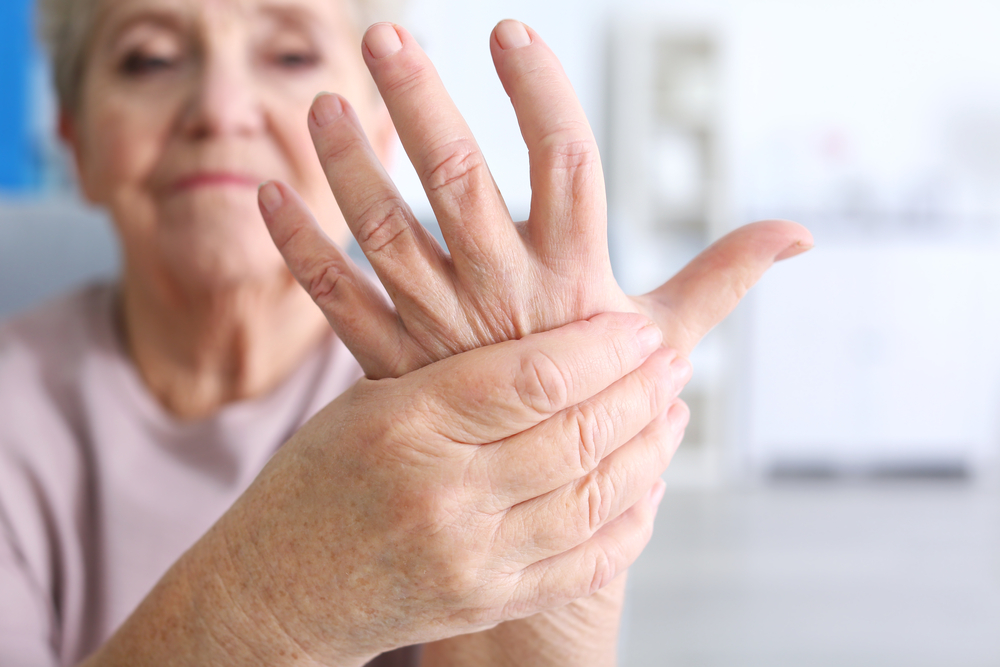Rheumatoid arthritis is a chronic disease — and it’s one that causes great pain. Although rheumatoid arthritis commonly appears between the ages of 30 and 60, this painful condition can specifically target seniors starting at age 601.
Every senior is at risk of developing rheumatoid arthritis. It’s a disease that gets more common with age, and symptoms can strike out of nowhere.
 Africa Studio / Shutterstock
Africa Studio / ShutterstockFortunately, if you’ve been diagnosed with RA, there are ways to treat your symptoms and manage your pain. Here’s everything seniors should know, and need to know, about living with rheumatoid arthritis.
What Is Rheumatoid Arthritis?
Rheumatoid arthritis is an autoimmune disorder that causes swollen, painful joints. Unlike ordinary arthritis, rheumatoid arthritis can affect the entire body. RA symptoms are triggered when a person’s antibodies mistakenly attack the normal synovial joint fluid, causing chronic inflammation. It’s the result of a very common autoimmune disorder, and RA is more likely to affect women than men.
More than 1.3 million people in the U.S. are living with rheumatoid arthritis2. Since rheumatoid arthritis has become so prevalent in the modern world, a wide range of treatments are emerging that can help patients improve their quality of life.
The Symptoms of Rheumatoid Arthritis
As a disease that’s centered primarily in the joints, the most common symptom people experience with rheumatoid arthritis is severe joint pain. Your joints become inflamed and tender, making it difficult to move and stay active. You may also feel a warm sensation in areas of your body that are commonly affected by rheumatoid arthritis, such as your hands, feet, knees, or elbows.
Typically, rheumatoid arthritis starts in one area of the body, then expands into other areas over time. RA is progressive, which means it worsens over time if it’s left untreated.
If you’re wondering how to spot the symptoms of RA, you’ll want to look for morning joint stiffness. This stiffness can be relieved with muscle movements — essentially, the pain can disappear once you start moving. Over time, RA symptoms worsen as joint damage occurs, like tendon erosion and reduced range of motion.
Popular RA Treatment Options
While there’s no cure for rheumatoid arthritis, you can take action to treat your symptoms. Most rheumatoid arthritis treatments focus on slowing the disease’s progression and reducing the severity of your symptoms.
Medication is one of the most popular treatment options. There are a number of different drugs available to treat rheumatoid arthritis, like the following3:
- Nonsteroidal anti-inflammatory drugs (NSAIDs): Available both over-the-counter and by prescription, NSAIDs can help RA pain and inflammation. They can also reduce joint swelling.
- Corticosteroids: These anti-inflammatory medications are fast-acting, and they can control inflammation and pain,
- Disease-modifying anti-rheumatic drugs (DMARDS): These medications try to modify RA itself, slowing down the disease’s progression. They’re available as pills, infusions, and injections.
- Biologics: Similar to DMARDs, biologics are fast-acting prescription medications that specifically target inflammation. These medications can slow down, modify, or stop RA.
Alternative RA Treatment Options
While medication can help soothe the symptoms of rheumatoid arthritis, it may not be able to alleviate all of your pain. In addition to taking medications, you can also try alternative or supplemental treatments to manage symptoms. To manage rheumatoid arthritis, you can combine medical treatment with the following alternative or natural options.
Stretching and Exercise
Stretching can reduce rheumatoid arthritis symptoms — but make sure you don’t put too much stress on your joints. Low-stress exercises, like swimming or cycling, can strengthen the muscles surrounding any affected joints. Consult your doctor or a physical therapist to develop a safe stretching or exercise regimen.
Hot and Cold
Applying heat packs or ice packs to painful joints can provide temporary relief. You may find that your RA symptoms respond better to one over the other, or a combination of both hot and cold.
Dietary Changes
Plant-based diets are thought to reduce inflammation, which is the biggest cause of pain in rheumatoid arthritis patients. Try to eat as many fruits, vegetables, grains, legumes, and nuts as you can to reap the benefits.
Supplements
Plenty of supplements or nutrients can help you manage your overall well-being when living with RA. Omega-3 fatty acids can reduce inflammation. Frankincense and turmeric also have anti-inflammatory properties. You can add these supplements into your daily diet. Probiotics in foods like yogurt, pickles, and cheese may also reduce RA symptoms.
Stay Informed to Better Manage Rheumatoid Arthritis
If you have rheumatoid arthritis, you don’t have to suffer the painful symptoms. Thanks to modern treatments and advances in medical technology, those who have RA can continue living full, active lives. The key is to manage your symptoms with available treatment options.
In order to maintain your health, you’ll want to be informed about the latest rheumatoid arthritis treatments. As increasingly more advances occur, you may be able to better manage your symptoms. Make sure you stay informed and talk to your doctor about the latest available medications, treatment options, and pain management methods. Being knowledgeable can reduce your pain and help you stay active, even with RA.


